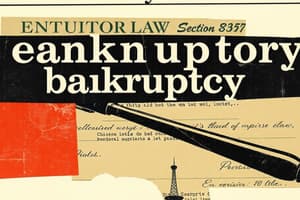Podcast
Questions and Answers
What type of contract involves performance remaining to be completed by both parties after acceptance of the offer?
What type of contract involves performance remaining to be completed by both parties after acceptance of the offer?
- Executory/Bilateral Contract (correct)
- Lease Contract
- Void Contract
- Unilateral Contract
Which of the following best describes a unilateral contract?
Which of the following best describes a unilateral contract?
- Involves multiple parties negotiating
- Is not enforceable at law
- Binds one party only when the other completes a task (correct)
- Requires promises from both parties
Who has full capacity to enter contracts as per the stated guidelines?
Who has full capacity to enter contracts as per the stated guidelines?
- Minors under age 18
- Cognitively impaired individuals
- Bankrupt persons
- Adults of sound mind (correct)
What does Section 124 of the Corporations Act 2001 (Cth) provide regarding corporations?
What does Section 124 of the Corporations Act 2001 (Cth) provide regarding corporations?
Under what condition are people with cognitive disabilities bound by agreements?
Under what condition are people with cognitive disabilities bound by agreements?
What is the capacity to contract?
What is the capacity to contract?
Which of the following statements about minors and contracts is true?
Which of the following statements about minors and contracts is true?
What is true regarding a person who is insolvent?
What is true regarding a person who is insolvent?
What is a key requirement for a contract to come into existence?
What is a key requirement for a contract to come into existence?
In what situation would a contract not be considered legally binding?
In what situation would a contract not be considered legally binding?
What does 'consideration' in a contract refer to?
What does 'consideration' in a contract refer to?
What is required for an acceptance of an offer to be valid?
What is required for an acceptance of an offer to be valid?
What is one of the necessary components of agreement in contract formation?
What is one of the necessary components of agreement in contract formation?
Which of the following is NOT an element of contract formation?
Which of the following is NOT an element of contract formation?
Which aspect is considered a separate formation requirement in contracts?
Which aspect is considered a separate formation requirement in contracts?
Which statement best describes a contractual offer?
Which statement best describes a contractual offer?
What factors did the court consider to determine if a statement was intended to be a legally binding promise?
What factors did the court consider to determine if a statement was intended to be a legally binding promise?
Under what condition is a signer bound by the terms of a document they've signed?
Under what condition is a signer bound by the terms of a document they've signed?
In the case of L’Estrange v F Graucob Ltd (1934), what was the outcome for L’Estrange?
In the case of L’Estrange v F Graucob Ltd (1934), what was the outcome for L’Estrange?
What are the two requirements for an unsigned document to form part of a contract?
What are the two requirements for an unsigned document to form part of a contract?
How can express terms in non-contractual documents affect a person?
How can express terms in non-contractual documents affect a person?
When may reasonable notice of express terms be regarded as incorporated into a contract?
When may reasonable notice of express terms be regarded as incorporated into a contract?
What must be true regarding the timing of terms for them to be included in a contract?
What must be true regarding the timing of terms for them to be included in a contract?
Which of the following is a condition under which a signer of a contractual document can claim ignorance of its terms?
Which of the following is a condition under which a signer of a contractual document can claim ignorance of its terms?
What must a person demonstrate to enforce a restraint under contract law?
What must a person demonstrate to enforce a restraint under contract law?
In the case of Linder v Murdock’s Garage, why was the restraint clause deemed unenforceable?
In the case of Linder v Murdock’s Garage, why was the restraint clause deemed unenforceable?
What determines the reasonableness of a restraint's enforceability?
What determines the reasonableness of a restraint's enforceability?
If a person can demonstrate that a restraint is unreasonable considering public interest, what is the outcome?
If a person can demonstrate that a restraint is unreasonable considering public interest, what is the outcome?
What is a common reason courts strike down broad restraint clauses?
What is a common reason courts strike down broad restraint clauses?
What would likely make a geographical limitation of an employment restraint enforceable?
What would likely make a geographical limitation of an employment restraint enforceable?
Which of the following would not likely contribute to the enforceability of a restraint of trade clause?
Which of the following would not likely contribute to the enforceability of a restraint of trade clause?
What aspect of the restraint did Boonie's case demonstrate when striking out a certain word?
What aspect of the restraint did Boonie's case demonstrate when striking out a certain word?
Under what circumstance would specific performance typically not be ordered?
Under what circumstance would specific performance typically not be ordered?
What is a mandatory injunction intended to do?
What is a mandatory injunction intended to do?
In which case was specific performance deemed appropriate due to the unique nature of the item involved?
In which case was specific performance deemed appropriate due to the unique nature of the item involved?
What factors may lead a court to deny an injunction?
What factors may lead a court to deny an injunction?
Why might specific performance require ongoing court supervision?
Why might specific performance require ongoing court supervision?
What is a prohibitory injunction designed to do?
What is a prohibitory injunction designed to do?
Which of the following statements about injunctions is true?
Which of the following statements about injunctions is true?
In the context of specific performance, why might a court consider the parties' relationships?
In the context of specific performance, why might a court consider the parties' relationships?
Flashcards are hidden until you start studying
Study Notes
Commemorative Coins and Contracts
- Esso’s offer of commemorative coins was a commercial promotion aimed at gaining benefit.
- Described as a ‘gift’, the offer implied legal binding intentions based on commercial circumstances.
- Executory/Bilateral Contract: Requires completion of performance by both parties after acceptance of the offer.
- Contracts arise from the exchange of promises, such as employment agreements where both parties have obligations.
Unilateral Contracts
- In a unilateral contract, only one party's performance is needed after the offer's acceptance, contingent upon a specific action by the other party.
- One party commits to perform only if the other fulfills a specific task, creating a binding obligation for that lone party.
Capacity to Contract
- Individuals of sound mind over the age of 18 have full capacity to enter into contracts.
- Corporations have equivalent legal power to natural persons under Section 124 of the Corporations Act 2001.
- Government bodies can enter contracts similarly to individuals.
- Persons with cognitive disabilities are bound by contracts unless incapacitation prevented understanding at the time of agreement.
- Insolvent individuals and those under intoxication may have restricted capacity to enter contracts.
- Minors possess limited power to bind themselves by contract.
Intent to Create a Legally Binding Agreement
- Parties must show intention to be legally bound, often established through formal documentation signatures.
- Masters v Cameron: Established that intent to be legally bound until formal documents are signed must be evident.
Pre-Contractual Phase
- Occurs before a binding contract is established; involves negotiation and information exchange.
- The critical question is whether a contract was formed and its terms.
Formation of a Contract
- Contracts exist when there is intention to be legally bound, an executed document or mutual exchange of value, and sufficient term agreement.
- Four key formation requirements for contracts include Agreement, Certainty, Consideration/Deed, and Intention.
Agreement
- A valid contract requires a meeting of minds with an identifiable offer and acceptance.
- An offer must be clear, promising, and sufficiently certain for acceptance to be valid.
- Acceptance needs to align perfectly with the terms of the offer.
Signing Documents
- Signing a document binds a person to the terms contained, even if not read prior to signing.
- L’Estrange v F Graucob Ltd (1934): Established that a party is bound by contractual terms when signing a document without fraud or misrepresentation.
Unsigned Documents
- Can form part of a contract if knowledge of terms is established and prior notice was given before contract formation.
- Reasonable notice can incorporate terms referenced in tickets or notices associated with a transaction.
Performance and Specific Performance
- Specific performance may be ordered when monetary damages are insufficient, though generally, it is used when ongoing court supervision is unnecessary.
- JC Williamson v Lukey (1931): Specific performance deemed suitable due to the unique nature of the item involved.
- Dougan v Ley (1946): Awarded specific performance for a unique car purchase tied to limited taxi licenses.
Injunctions
- Injunctions compel actions (mandatory) or prevent actions (prohibitory) and can address breaches of contract.
- Not granted if damages suffice or if enforcing a contractual promise that cannot be upheld through specific performance.
Restraint of Trade Clauses
- Must be reasonable in geographic and temporal scope for enforcement.
- Linder v Murdock’s Garage (1950): Found restraints overly restrictive, limiting the individual's work opportunities beyond necessary means.
Express Statutory Illegality
- Certain agreements are directly prohibited by law, establishing clear boundaries for enforceable contracts.
Studying That Suits You
Use AI to generate personalized quizzes and flashcards to suit your learning preferences.




